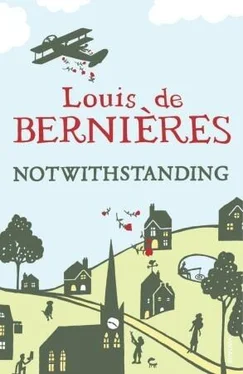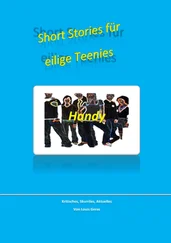Joan exclaims, ‘Ooh look, what’s Wellington up to?’
The other two follow the line of her pointing finger and see Wellington the black Labrador bounding up and down on the spot, his ears flopping forward. He appears to be nudging something. He goes down on his forepaws, his backside in the air, and barks senselessly.
‘He must have found something,’ says Leafy.
With one accord they change course, and fifty yards later they see that Wellington has indeed found something. Joan makes Wellington sit, and slips on the lead. Side by side they look down, without a word.
‘Poor little bugger,’ says the Major at last.
‘It’s so awful,’ says Leafy, her voice trembling with shock and sorrow.
‘It makes you sick,’ says Joan.
‘To think this was introduced on purpose … by man,’ says the Major. ‘It’s vile, it’s damned vile. What a bloody thing to do. Whoever invented this ought to be strung up and flogged.’
At their feet, in the last extremity of its suffering, is a myxomatosis rabbit. Its flanks have caved in from thirst and starvation, its lustreless coat is loose, hanging in folds. Deaf and blind, it cowers in the long grass, dimly aware that something is happening, but too weak to move. It is attempting to eat the grass, but its mouth is too swollen. It chews on nothing, or perhaps on the ulcers of its own tongue. It chews mechanically and thoughtlessly, as if, by this token eating, it can assuage some of the hollow agony of its unassuageable hunger.
The little creature is so abject, so miserable, so pitiful, that it is heartbreaking just to stand and look. The worst thing, the most horrifying, is that its eyelids are stuck together, and what were its eyes behind them have inflated to the size of table-tennis balls. The effect of this swelling is entirely grotesque, the horrifying globes transforming the rabbit into something that seems other than a rabbit. It has become a monster imagined by the cartoonist of a horror comic.
‘I can’t bear it,’ says Leafy Barkwell.
‘The poor little mite,’ says Joan.
The rabbit does not try to get away. It remains still and quiet, trying to eat, hoping that if it remains still for long enough, everything might begin to get better. It is so harrowed by misery that it has lost all sense of self-preservation. For days now it has stayed out in the same place in the grass, unable to find its burrow, freezing and shivering by night in the March frosts, drenched by the March rain, buffeted by the March gales, enduring the slow cruciation of this casually inflicted death, its own insignificant, tiny, world-destroying Calvary. It stays perfectly quiet, and never loses hope, but it is a most unfortunate miracle that it has not yet been found by a fox.
The Major is an old soldier, and he knows his duty. He takes no pleasure in saying, ‘I am going to have to kill it.’
Leafy puts her hands to her face and exclaims, ‘Oh please, not with me here.’
‘Wait till we’ve gone,’ pleads Joan.
The Major is relieved not to have to do it immediately. He says, ‘I’ll come back with the airgun.’
At the house the Major takes the airgun out of the cupboard. It is a Webley Mk III, very heavy, with a tapered barrel. It is a powerful.22 and is ideal for hunting small game over open sights. At one time it represented the best in British engineering, except that some idiot designed the rails so badly that they lifted off when you tried to mount telescopic sights. Years ago the Major had bought it as a present for his young son, feeling that it was his duty to teach him the manly arts, thinking that perhaps he might grow up to be a soldier, or that one day, if there was yet another war, it would be useful for the sons of England to know how to handle themselves in a fire-fight. The Major had taught his boy how to do rapid fire, how to allow for movement and windage, how to follow through, but now the boy works in the City, pale and sleepless, conjuring money out of thin air, his mouth spewing out American business jargon, driving around in a Porsche instead of a proper car, displaying a kind of energy and merriment that seem entirely artificial and out of character with the teenager that he used to know. The Major strokes the walnut stock of the Webley and thinks of the fantasies he used to entertain on his son’s behalf, before the world turned into something that he hadn’t realised he had been fighting for. He handles the walnut stock of the Webley and remembers the.303 Lee-Enfield that stayed with him undamaged from the start of the war to its end. He wonders what happened to it.
He takes the airgun out into the field behind the house and is sorry to find that the piteous, oblivious little creature is still there. He realises that he really will have to do his duty. He bends down and strokes the rabbit down the length of its nose. It barely reacts. It occurs to the Major that the animal is so nearly dead that he might just as well leave it to die at its own pace, let it make its own quietus. He remembers Glub Pasha telling him years ago that his Arab troops believed that animals should be given time to think about life while they die, which is why they used to cut their throats with three strokes of a knife. ‘Whatever happened to Glub Pasha?’ he asks himself.
The Major strokes the rabbit’s nose again, and says, ‘Little fellow, I want to say how sorry I am for what’s … for what’s been done to you. Poor little bugger. I’m so sorry.’ He strokes the animal’s flank and feels the hard starkness of the ribs.
He straightens up and cocks the underlever of the Webley. He takes a lead pellet from the tin in his pocket, opens the tap of the gun and drops the pellet in. He checks it has gone home properly, and closes the tap. Against his will, but in accordance with his duty, he places the barrel of the gun between and just forward of the rabbit’s ears. He steels himself, squeezes the trigger and feels the gun leap in his hands.
At his feet the rabbit has flung itself on to its side, and from its mouth there spurts a small cascade of inconceivably brilliant scarlet blood. Its back legs kick feebly, and, most heart-rendingly of all, so great is the pain of its starvation compared to the pain of its death wound that it continues trying to eat, its jaws moving ceaselessly.
It kicks again, and then the Major makes a mistake. He knows that really it is dead already, that it died instantly, but he wants it to stop kicking and chewing. He reloads the gun and places the gun barrel against the side of the rabbit’s head, right against the hideous globe of its left eye socket. He pulls the trigger and then leaps back in horror, because a thick shower of bright white pus has exploded out of its head and spattered his trousers, his jacket, his hands, the barrel of his gun. It had never occurred to him that the swelling had been anything other than a swelling. He walks backwards a few paces, sees that the animal is completely dead, wishes it, perhaps ridiculously, a safe homegoing to wherever it has gone, and walks swiftly back to the house, too upset for thought.
Joan has waited in the kitchen, and she sees him come in, his face white with distress. She puts her hand to his face, and he says in tones of quiet disbelief, ‘Its head was full of pus, and it exploded.’
She looks at him as he takes a paper towel and wipes down his clothes and the gun. ‘Go and change,’ she says. ‘I’ll put your things in the machine.’
The Major sits at the desk in his study, hands on his knees, looking out of the window at the laurels. A squirrel spirals up the oak tree, and a green woodpecker inspects its crevices for bugs. His clean clothes feel stiff and unyielding. His wife comes in with a cup of tea. It is her own blend, half Tetley tea bag and half Earl Grey. She puts it down carefully on his blotter and asks, ‘Are you all right, darling?’
Читать дальше












